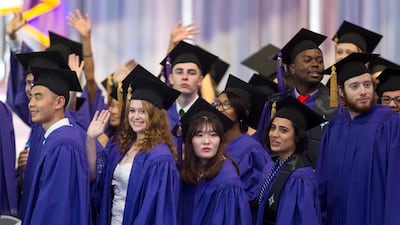University leaders said a move to allow international students to sponsor their families for the duration of their studies would prompt a rise in enrolments in the UAE.
On Sunday, Sheikh Mohammed bin Rashid, Vice President and Ruler of Dubai, said foreign students would be permitted to bring relatives to the country with them "whenever they have the financial means" to do so.
The UAE Cabinet directive is set to encourage more learners to make the Emirates their chosen destination for undergraduate and postgraduate courses – and give them the incentive to lay down roots in the country long after they finish their academic journey.
Higher education chiefs said the decision would help students plan their futures.
Professor Ammar Kaka, provost of Heriot-Watt University Dubai, said families coming in would seek employment, possibly invest in property and stimulate economic growth, which would be critical for post-pandemic recovery.
“This move will encourage more and more foreign students to come here to study in the UAE,” Professor Kaka said.
“Students and their families can now plan a long-term future here in the UAE and one that goes beyond just the duration of their study.”
Heriot-Watt University Dubai has about 4,000 students with 105 nationalities represented, with many from Africa or the Middle East.
The decision to allow foreign students to sponsor families is the latest in a series of measures aimed at increasing international enrolment in the UAE.
In November, the Emirates expanded its 10-year golden visa system to high-achieving pupils and students leaving universities with a grade point average of at least 3.8.
Last month, UAE universities joined forces with education authorities to develop online degrees to help attract prospective students from around the globe. But education chiefs believe more work must be done.
Lower fees and more scholarships key to boosting UAE’s university population
“To attract more students, universities can create more part-time work opportunities, offer more scholarships and offer courses catering to the jobs of the future,” Professor Kaka said.
He said affordable and purpose-built student accommodation would make studying in the UAE more attractive for families.

Soraya Beheshti, the regional director for Crimson Education, a global education consultancy, said offering more scholarships was important for attracting talent.
“The universities here are are quite expensive and students pay the same fees as at the top-ranked universities in the world,” Ms Beheshti said.
“If universities lowered fees that would be immensely helpful but whether universities can do that, I don’t know.”
At American University in Dubai, undergraduates pay an average of Dh45,000 ($12,250) per semester.
She said the UAE would attract an influx from regions from where migration to the country was desirable.
“I expect to see a lot of students from North Africa, Egypt, Morocco and South Asia bringing their families,” she said.
“There is interest in migrating to the UAE, so this will hopefully bring a lot of students here.”
Ms Beheshti said students are economy boosters because they dine out often, participate in social life and are good consumers.
“While the rest of the world is tightening restrictions and closing borders the UAE has taken a step towards opening up even more,” she said.
“A lot of people have left the UAE so there is a need to inject the community with fresh blood.”
American University in Dubai has about 2,000 students, many of whom have travelled from South Korea, South Africa and the US.
UAE an attractive option for overseas students in Covid-19 age

Dr David Schmidt, president of the university, said the pandemic would make families rethink sending their children to the UK or US for higher studies.
Coupled with this, the proactive way Covid-19 was handled in the UAE, and the scale of its vaccine programme, would help.
“UAE would look like a safe haven which can provide a world quality education,” said Dr Schmidt.
“I worked in the United States for 25 years, and I think parents would now hesitate to send their children to New York or California, but I do not think they will hesitate to send them to Dubai.”
Dubai had close to 30,000 international students at institutions licensed by the Knowledge and Human Development Authority in 2019.
Dr Vajahat Hussain, chief executive of Amity Education Middle East, said the new policy would be effective only if framed correctly.
Amity University Dubai has 2,000 students, of whom 800 applied from abroad.
He said students should have the flexibility to secure the visa for the duration of the course, so they would not have to obtain an annual renewal.
“If framed correctly it can be a catalyst and as economy booster,” Dr Hussain said.
“If people feel they can come here, settle and create homes for their children, they will inject money in the economy.”
Tuition fees in the Emirates can be prohibitive for many families, and some education experts called for more scholarships or reductions to tuition costs. But Dr Hussain said cutting fees was not an option.
“The quality of higher education depends on the quality of faculty at the university. If the quality of faculty need to be given salaries in line with the market, there is no way the fee can be reduced,” he said.






